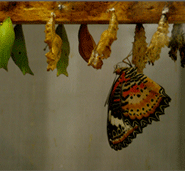The Winter’s Tale begins with a song, with one character, Hermione, appearing in the centre of a canopied stage to sing, as others quickly burst out from behind foliage and join in. Produced by the Tadpole Repertory and Wide Isle Productions, this Tale engages in many experiments – an outdoor, mobile setting; live music; multiple languages – but perhaps the most radical is this flash mob inspired-opening. In this vein, the trajectory of the play and its setting develop in conflict: as the show begins, early in the evening, it is warm outside with a pink sun, but the moods of the characters rapidly thunder and darken. Then, for Act Three, as the audience shivers and the sky is black, we are treated to reunion and celebration.
As a student of film, accustomed to a single moderated temperature and a single black rectangle to stare at, it’s interesting to look at non-traditional theatre. Film has the luxury of infinite locations and special effects: when Antigonus exits, pursued by a bear, he’ll be followed by something approximating the real thing, instead of a man in a bear costume (though nothing beats the charm of the latter). Moviegoers were shocked when they first saw a train pulling into the station in the Lumière brothers’ film Arrival of a Train at La Ciotat, thinking it would exit the screen and barrel into the audience, or when they saw a shadowed figure plunge his knife into Janet Leigh in Psycho, but it seems impossible to surprise us now. However choreographed it is, theatre is live, and each performance can change on the raising of an eyebrow or a fluctuation in tone. In The Winter’s Tale, distant cackling birds and clanging metal create an organic atmosphere, contrasting with the actor’s sharp, distinct intonation of Shakespeare’s dialogue.
The opening scene of the play is its most intriguing: directors Anirudh Nair and Neel Chaudhuri have chosen to show their three lead actors, portraying King Leontes, his wife Hermione, and his friend Polixenes, in a sort of pas de trios. A tambourine is juggled between them, as each tries to slap it while it’s in the hand of the other. In the play, Leontes believes that his wife and friend are having an affair, which drives the first two tragic acts of the play. Shakespeare’s script, however, makes it clear that the affair is a figment of his fitful, jealous imagination. Yet in this opening scene, the slip of the tambourine between Hermione and Polixenes’ entwined arms seems to suggest otherwise. It’s a nice bit of ambiguity that does more to freshen and complicate the story than any other break from tradition.
But still, despite all its innovations, this edition of The Winter’s Tale remains conservative in the acting itself. I may be spoiled by close-ups, which demand the utmost subtlety from their actors to succeed. The cast of Tale is very good – strong, bold, emotional – but no one takes the risk of underplaying their roles, or of allowing the loose structure lent by dance and nature to seep into their acting. Rather, the riskiest move comes from Shakespeare himself. Classic Hollywood cinema, another tightly contained entity, borrows its unbreakable three-act structure from Shakespeare. The audience comes to expect setup, conflict, and resolution, in that order. And yet in The Winter’s Tale, Shakespeare resolves his hitherto wretched story with a controversial deus ex machina, in which art is transformed by nature – literally, as it is in this production – to provide a happy resolution of all mixed feelings.
Simran Bhalla is a writer living and working in Delhi.
The Tadpole Repertory is a collective of theatre practitioners working in the new.
Wide Isle Productions is a endeavors to make Shakespeare accessible to school children.
The Winter’s Tale is playing March 1-2-3 and 8-9-10 in Delhi. For more details:
Editor's Note.
'Tis in ourselves that we are thus or thus. Our bodies are our gardens, to the which our wills are gardeners. So that if we will plant nettles or sow lettuce, set hyssop and weed up thyme, supply it with one gender of herbs or distract it with many—either to have it sterile with idleness, or manured with industry—why, the power and corrigible authority of this lies in our wills. [WS, Othello, III.3]
Read More
By Simran Bhalla, Issue 19, Will: A Desire and A Destination, March 2013
Also in this issue
Illusion: Seeing Beyond Seeing
Meaning: In Search of Significance.
Melody: A Different Tune
Rhythm: Ordering Time












